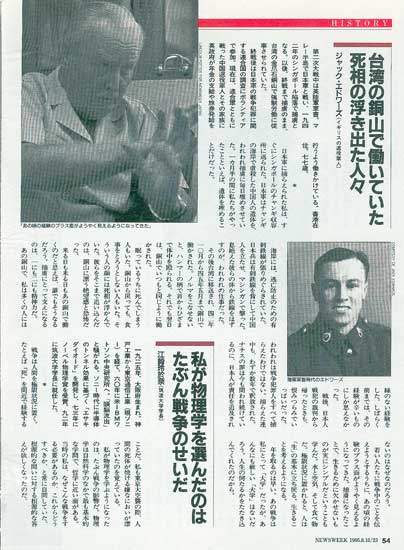... from Japan ...
Jack Edwards
The faces of the people who worked in the Taiwan copper mines reflected the shadow of death.
Jack Edwards (Ex-British army)
A British army sergeant during the Second World War. He fought the Japanese army on the Malay peninsula and he was captured at the fall of Singapore in 1942. After which, he remained captive until the end of the war. He was forced to labour down Taiwan's Kinkaseki copper mine.
After the war he took part as a volunteer in the allied countries investigations into Japanese war crimes. Now, he works with the Chinese and their families who fought with the allies, to ensure that they receive pensions and travel passes from the British government. He lives in Hong Kong. He is 77 years old.
After I was captured by the Japanese army, I was soon sent to the Changi prisoners camp. Every day we had to bury the corpses of the Chinese who had been massacred by the Japanese army in the Changi bay area. In the space of one and a half months I can say that the only the thing I did was to bury those corpses.
Down by the coast, to prevent runaways, we were surrounded by barbed-wire. The Japanese army made the Chinese line up with their backs against the barbed wire and shot them by machine-gun. It was our job to pull the barbed wire from their bodies when they had stopped breathing.
Next I was sent to Taiwan. I was forced to work in the mines from October 1942 to May 1945. If we could not fulfil the days forced labour, we would be hit from our necks to our knees with the butt of a pick-axe. Even then, the next day we would be back down the mine forced to do the same labour.
There were people who died while sleeping. Even those going back to the mines, did not care enough to eat. Those people had the shadow of death on their faces. They knew they were going to die, and they drifted in the mines with fear and despair.
The days went on and on, anyone who was in that mine would have felt the same. Courage came from tiny pieces of spiritual strength. In that mine, I had little to do with most of the people. For a while I thought that was happiest way.
After the war, even after I had returned from participating in the Japanese war crime trials, I was filled with so much hatred and pain. We had not captured all of the Japanese war criminals. And those we had caught were freed after a few years. Even now the investigations for Nazi war criminals continues, why is it that the Japanese have not faced up to their responsibilities?
When telling young people about wartime, we can at last see a positive side of the experiences of that time. The courage we drew on, we learnt that the strength to live comes from little things. Water and air, and food. When
you are pushed to the limits, people return to the basics of 'life'. They begin to think about living. I have aged quickly. For me, that war was my 'university', but was there a more horrifying 'university' than that, that which was hammered into my life?
#



